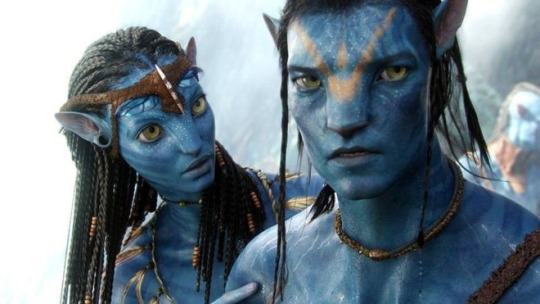#Horrible little room with evil feng shui
Explore tagged Tumblr posts
Text


Fine i'll reveal myself to the horrific panopticon they call "The Internet" but they better start cranking it nasty to me or else
#me#Horrible little room with evil feng shui#disregard it#Forgettable Fat Ass#Pale like an eyeless cave slug#looking like i was painted with that landlord white#Cheap Porcelain youd find at goodwill#Other white people think im a little too white#sure
42 notes
·
View notes
Text
blog 04 - avatar (the one with the blue people not the last airbender)

preface
I went into this with absolutely no feelings about this movie beyond the absurdity of how many sequels it’s apparently going to get. As an artist, I find the visual effects extremely impressive even to this day, but as a storyteller, I thought this story was almost so inoffensive that it’s offensive.
However, I think that engaging with things in good faith is a good way to find ways to expand your horizons and thoughts, and I like to enjoy things despite my dad’s insistence that I like to not enjoy things. (It’s not that I like to not like things, it’s that it’s easier to entertain people when it’s a bad review. Tough crowd.) I’m a firm believer in the idea that cerebral analysis of media adds to the joy of consumption rather than takes away from it, so let’s dive right in.
I like structure, so we’re gonna layer it like a delicious theme cake.
1. the elephant in the room
Everyone has seen Pocohontas. Everyone has seen Dancing With Wolves. I’m not really here to rehash arguments, but I think getting into this movie without addressing what first comes to everyone’s mind when they think about it is pretty much impossible. The “White Savior” trope is more or less a narrative cliche in which a noble white person will take a stand against the Bad White People on the side of a sympathetic oppressed people-- Native Americans see this plotline probably the most, but black people still see it today every now and then (Green Book got nominated for a lot of Oscars, after all. The hunger is there for easily digestible feel-good race relation drama.) Wikipedia sums up the White Savior trope better than I could, so here it is:
“At the cinema, the white savior narrative occupies a psychological niche for most white people, as an expression of their latent desire for interracial goodwill and reconciliation. By presenting stories of racial redemption, involving black people and white people professing to reach across racial barriers, Hollywood is catering to a mostly white audience who believe themselves unfairly victimized by non-white ethnic groups, because they are culturally exhausted with the unfinished national discourse about race and ethnicity in the society of the United States. Hence, films featuring the narrative trope of the white savior have notably similar storylines, which present an ostensibly nobler approach to race relations, but offer psychological refuge and escapism for white Americans seeking to avoid substantive conversations about race, racism, and racial identity. In this way, the narrative trope of the white savior is an important cultural artifact, a device to realize the desire to repair the social and cultural damage wrought by the myths of white supremacy and paternalism, regardless of the inherently racist overtones of the white-savior narrative trope.“
Native Americans factor into this most significantly in the case of Avatar-- aliens in movies are hardly ever just aliens. Whether they represent an oppressed underclass (District 9), childhood innocence (E.T.), or fear of foreign invasion (War of the Worlds), aliens are an easy vessel to carry almost any idea you want them to. So if the Na’vi are more or less an ideological stand-in for Native Americans during the conquest of America, our protagonist Jake is the future space cowboy to the Cowboys and Indians In Space.
Both Jake and Grace sort of fall in and out of the White Savior space-- ultimately Grace condescends to the Na’vi a little more and she has a more complete character arc that ends with her transcending this trope, but Jake is whole hog in it. He’s like, the legendary prophecy warrior. He’s The Guy.

(Pictured above: The Guy)
James Cameron grapples pretty hard with the White Savior trope-- he never truly goes one way or another about it and the concept of Avatars-- as in the Na’vi bodies that Jake and company jump into-- significantly...well, complicates the idea of race relations in this movie. There are certainly some uncomfortable ideas about identity wrapped up in the concept of body swaps (if this idea interests you, Altered Carbon is a really good read), but re: the readings and lectures, the concept kind of works towards what is ultimately the broad takeaway of the movie.
In summary: no, we’re not doing this whole review about White Guilt in Space. Now that that’s out of the way...
2. james cameron predicted late stage capitalism
Imperialism
"The policy of extending the rule or authority of an empire or nation over foreign countries or of acquiring and holding colonies and dependencies."
Avatar is about imperialism. This is as broad and pointed a theme as you can get from a movie that draws such heavy inspiration from Native American and Aboriginal cultures. Interestingly enough, the movie’s futuristic setting goes hand in hand with the commentary about the military and Western Imperialism.
The company in Avatar, and all the almost comedically evil military men, are very brazen about their lack of ideological purpose. They are on Pandora for money. They are being paid to go to Pandora to take its resources-- the delightfully named “Unobtanium” in specific. As mentioned in the reading, Unobtanium is valuable for its properties as a superconductor, and I’m not a STEM kid, so I’ll leave it at that for simplicity’s sake.
That the mercenary force on Pandora is so open about their exploitative intentions draws an interesting parallel to the world of today that’s maybe a touch haunting, considering that Avatar came out some years ago. In politics, at least up until now, you notice the use of a few common euphemisms as smokescreens for more extreme ideas-- for example, the Right’s: “protecting American jobs”.
Protecting American jobs is a euphemism for racism against Mexicans-- it was the most common smokescreen reasoning for the border wall pre-Trumpian politics. Trump and company have since dropped the euphemism all together. The death of a euphemism usually means that the euphemism is no longer culturally or socially required-- you can just come out and say whatever horrible thing you mean. In Avatar’s universe, it’s clear that the political-economic climate has come to a point where they can just say that they’re there to steal the Na’vi’s resources whether they like it or not.
The movie and the lecture both draw specific attention to the parallels the film draws explicitly between military tactics used in the movie, and real-world events. “Shock and Awe”, a tactic coined by the Bush era, is referenced in exact terms-- it being a display of overwhelming force intended to break the fighting spirit of the enemy. The commander character whose name I just read but I can’t remember now says that he is a veteran of both Venezuela and Nigeria-- both real world locations in which the U.S. has invaded and destabilized for material interests under the guise of American ideology.
In Avatar, we see the thin veneer of “freedom and democracy” as the driving forces of U.S. intervention stripped away explicitly. The opening narration of Jake’s arrival to Pandora has him say that “on Earth, these men were soldiers fighting for freedom...but here, they’re mercenaries”, however, the line between a supposed freedom fighter and a mercenary is borderline nonexistent.

3. western scientific objectivism sucks
Another current running through Avatar is the juxtaposition of what is “real” with what is “unreal-- aka Western objectivity science versus belief systems. This is embodied in the character of Grace, a scientist and anthropologist who has been researching Na’vi culture for some time. The reading characterizes her as “the happy face of liberalism” that tries to put a nice coat of paint over the same imperialist ideas that the more blunt military types embody-- she is kinder to the Na’vi and sees their culture and planet as worth preserving, but she is ultimately dismissive of their beliefs and of Eywa (”pagan voodoo”) the same as the other mercenaries.
We’re gonna put on tinfoil hats for a little bit here to make a relation between Western culture (imperialism and colonialism) and capitalism and paganism. Are you ready?
Okay.

So you know how they burned witches at the stake at the onset of the Industrial Age in America and the pagan practices of “hedge magic” were pretty much obliterated? I don’t think that’s a coincidence. Capitalism is a system that can only operate materialistically-- people aren’t “people” but “workers”, and the concept of magic and belief exists in terms that capitalism can’t define, and more importantly, can’t exploit. So witches were burned and women were placed with great reinforcement back into domesticity, where their function in capitalism was to give birth to and rear new workers.
You can see this dichotomy between the science of objectivity (what is “real”) and belief systems (what is “unprovable”, “unobservable”) in the way Grace uses scientific terms to justify the Na’vi’s spirituality. A very powerful through-line can be seen in the way that imperialism, capitalism, materialism, and objective science intersect. Their interconnected natural collective consciousness is like the raw function of a brain to her, likened to a network. It isn’t until Grace is mortally wounded and experiences the Na’vi’s healing ceremony that she is able to transcend the capitalistic, materialistic terms for definition for Eywa to have a spiritual experience, and to become one with Eywa herself (”she’s real.”)
In a plot that hinges on the material (Unobtainium) interests of a capitalist mercenary force, the ultimate refutation of this is the Na’vi’s spiritual values.

4. avatar: endgame
So what is this all working towards? Well, the idea of an interconnected spirituality like Eywa. The idea takes root in geomantic ideas, more commonly known as “feng shui”-- it’s sort of the concept of an earthly energy, a flow that moves through and connects the Earth and its people and creatures. The strange braid cord things that allow the Na’vi to interface with certain points and other creatures is a very straightforward metaphor for that concept of feng shui and geomancy.
Here we come back around to the concept of Jake as the White Savior/chosen one/The Guy. It’s kind of obtuse, but the general theory is that Eywa chose Jake as a sign that all peoples must needs transcend their boundaries and become one with the larger concept that Eywa represents. This of course comes packaged with an urgent environmental message-- our life is that of the planet, and to exploit and sacrifice one is to sacrifice the other.
Pandora, Eywa, and the Na’vi represent the polar opposite of everything that capitalist imperialism is. Thus, James Cameron, ironically, used a huge budget Hollywood endeavor to refute everything that Hollywood is. Now he’s making Alita: Battle Angel.
Funny how that works. Oh, I made myself sad.
3 notes
·
View notes